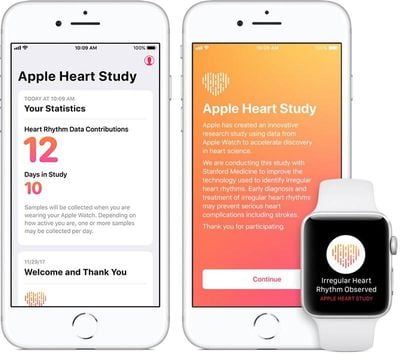Over 2,000 Participants Received Irregular Heart Rhythm Notification in Apple Watch Study
Stanford Medicine researchers presented their findings of the Apple Heart Study at the American College of Cardiology's 68th Annual Scientific Session and Expo in New Orleans today, as noted by Apple in a press release.

Apple and Stanford created the study to evaluate the Apple Watch's irregular heart rhythm notification feature, which occasionally checks the wearer's heart rhythm in the background and sends a notification if an irregular heart rhythm appears to be suggestive of atrial fibrillation.
419,093 people across the United States participated in the study. As part of the study, if an irregular heart rhythm was identified, participants received a notification on their Apple Watch and iPhone, a phone consultation with a doctor, and an ECG patch for additional monitoring.
Study results showed 0.5 percent of participants - approximately 2,095 people - received an irregular heart rhythm notification. Apple says "many participants sought medical advice following their irregular rhythm notification."
Apple COO Jeff Williams:
We are proud to work with Stanford Medicine as they conduct this important research and look forward to learning more about the impact of Apple Watch alongside the medical community. We hope consumers will continue to gain useful and actionable information about their heart health through Apple Watch.
Apple announced the Heart Study in collaboration with Stanford back in November 2017 and stopped accepting new participants in August 2018.
Popular Stories
Despite being more than two years old, Apple's AirPods Pro 2 still dominate the premium wireless‑earbud space, thanks to a potent mix of top‑tier audio, class‑leading noise cancellation, and Apple's habit of delivering major new features through software updates. With AirPods Pro 3 widely expected to arrive in 2025, prospective buyers now face a familiar dilemma: snap up the proven...
Apple's iPhone development roadmap runs several years into the future and the company is continually working with suppliers on several successive iPhone models simultaneously, which is why we often get rumored features months ahead of launch. The iPhone 17 series is no different, and we already have a good idea of what to expect from Apple's 2025 smartphone lineup.
If you skipped the iPhone...
A developer has demonstrated Windows 11 ARM running on an M2 iPad Air using emulation, which has become much easier since the EU's Digital Markets Act (DMA) regulations came into effect.
As spotted by Windows Latest, NTDev shared an instance of the emulation on social media and posted a video on YouTube (embedded below) demonstrating it in action. The achievement relies on new EU regulatory...
Apple plans to release an all-new super thin iPhone this year, debuting it alongside the iPhone 17, iPhone 17 Pro, and iPhone 17 Pro Max. We've seen pictures of dummy models, cases, and renders with the design, but Lewis Hilsenteger of Unbox Therapy today showed off newer dummy models that give us a better idea of just how thin the "iPhone 17 Air" will be.
The iPhone 17 Air is expected to be ...
While the iPhone 17 Pro and iPhone 17 Pro Max are not expected to launch until September, there are already plenty of rumors about the devices.
Subscribe to the MacRumors YouTube channel for more videos.
Below, we recap key changes rumored for the iPhone 17 Pro models as of April 2025:
Aluminum frame: iPhone 17 Pro models are rumored to have an aluminum frame, whereas the iPhone 15 Pro and ...
Apple seeded the third beta of iOS 18.5 to developers today, and so far the software update includes only a few minor changes.
The changes are in the Mail and Settings apps.
In the Mail app, you can now easily turn off contact photos directly within the app, by tapping on the circle with three dots in the top-right corner.
In the Settings app, AppleCare+ coverage information is more...
Apple is preparing a "bold" new iPhone Pro model for the iPhone's 20th anniversary in 2027, according to Bloomberg's Mark Gurman. As part of what's being described as a "major shake-up," Apple is said to be developing a design that makes more extensive use of glass – and this could point directly to the display itself.
Here's the case for Apple releasing a truly all-screen iPhone with no...
If you have been experiencing issues with wireless CarPlay in your vehicle lately, it was likely due to a software bug that has now been fixed.
Apple released iOS 18.4.1 today, and the update's release notes say it "addresses a rare issue that prevents wireless CarPlay connection in certain vehicles."
If wireless CarPlay was acting up for you, updating your iPhone to iOS 18.4.1 should...























